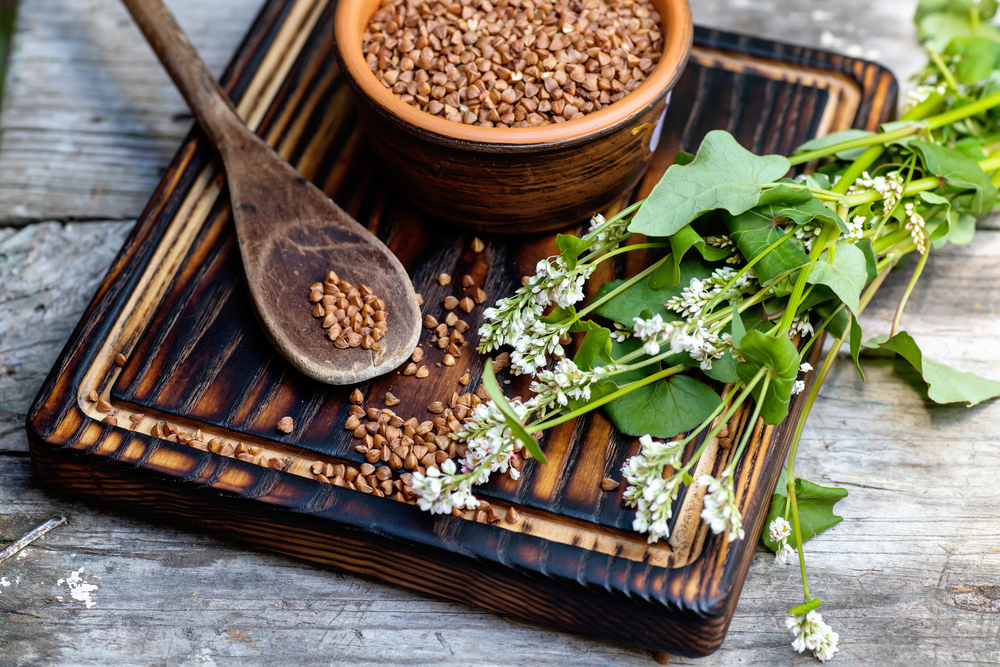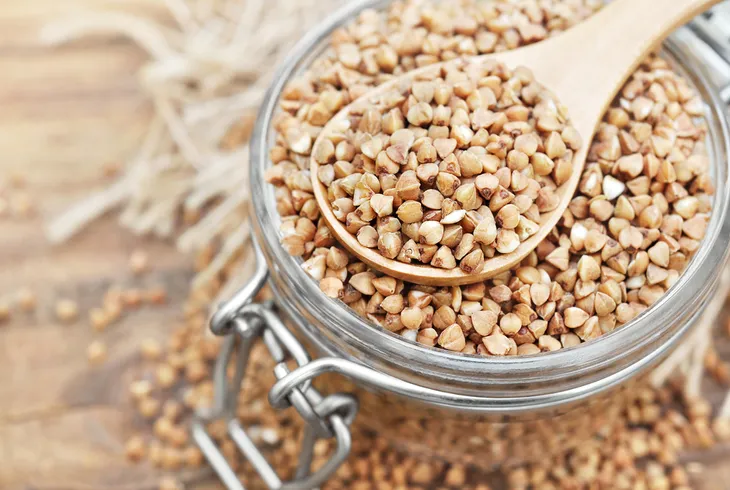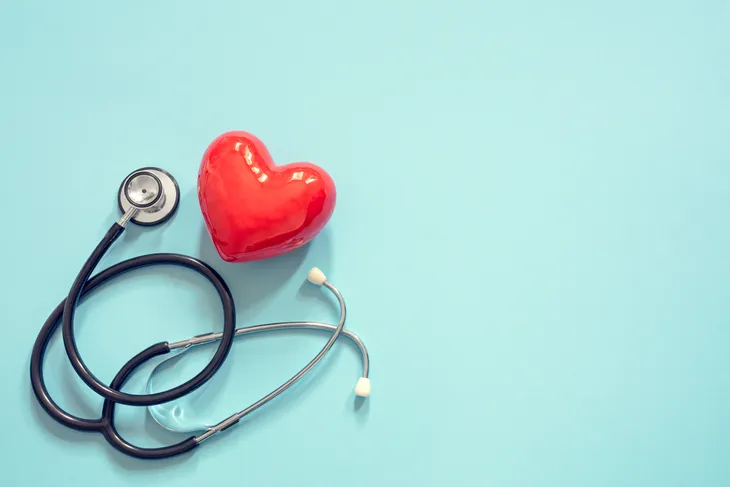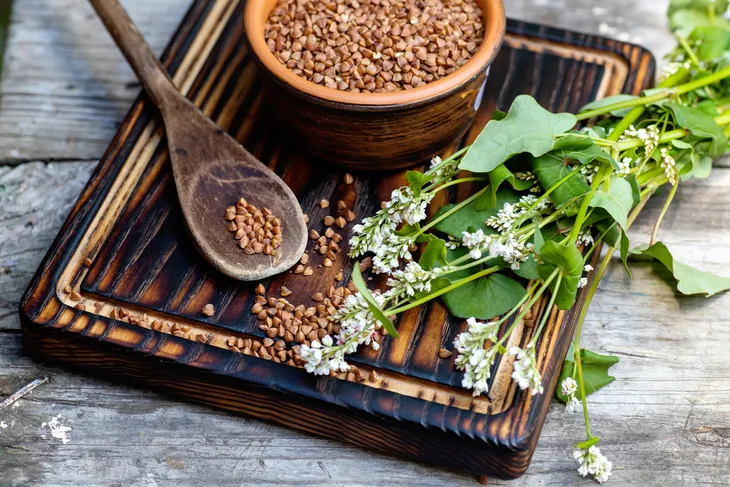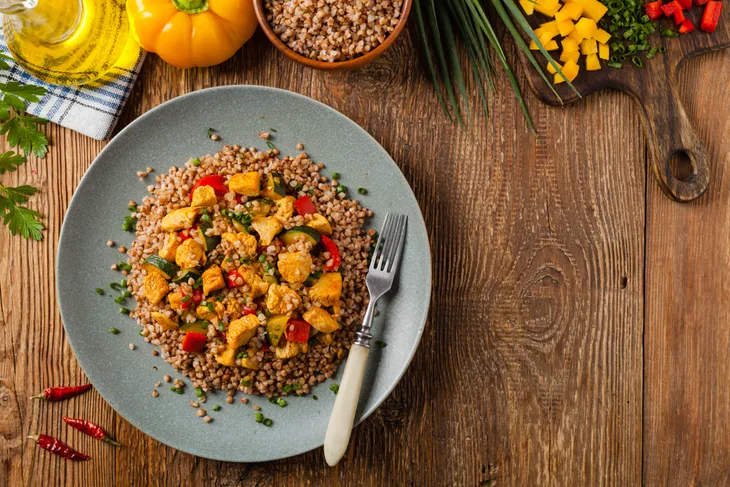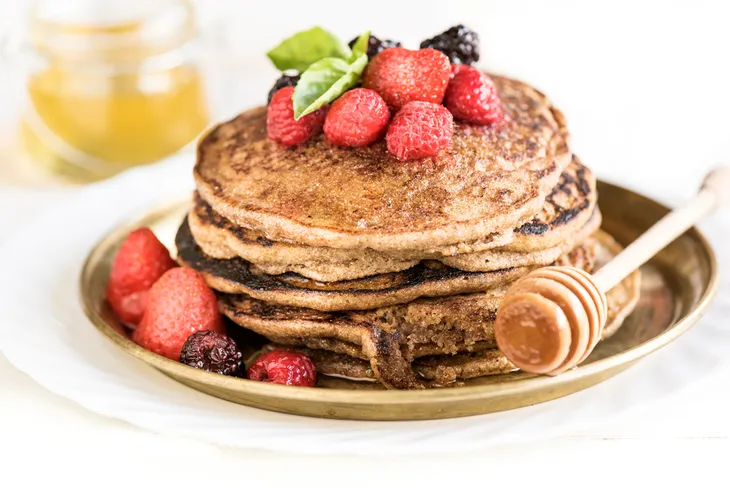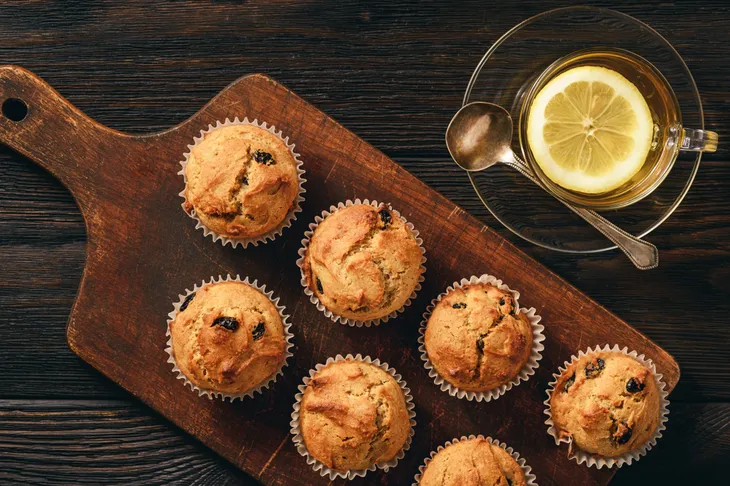If you hang out around gyms and wellness blogs long enough, you’ll no doubt hear all about the new and exciting tricks of the nutritional trade. You may learn about new exercises and equipment that are designed to maximize results or you may learn about new grocery store items to help increase performance, shave pounds, and save money.
Today, we’re going to talk about one such grocery store staple. The health benefits of buckwheat have been enjoyed by much of the Eastern World for centuries. But here in America, we’re just learning of its awesomeness. Here are 7 incredible health benefits of buckwheat plus a few ways to start incorporating it into your diet.
What Is Buckwheat?
From a technical standpoint, buckwheat is a pseudocereal. Unlike traditional cereals, buckwheat doesn’t grow on grasses. It can be processed into flour, groats, and noodles, or used to make tea. It’s harvested and primarily consumed in the northern hemisphere.
From a straight nutrition standpoint, buckwheat consists mostly of carbs. A 100-gram serving of raw buckwheat is 343-calories and contains 10-grams of fiber, 71.6-grams of carbs, 3.4-grams of fat, and 0-grams of sugar. Now that we have an understanding of what buckwheat is, let’s look at its potential health benefits.
Gluten-Free
Don’t let the word “wheat” throw you off. Buckwheat is entirely gluten-free! Of course, gluten is a general name for the various proteins found in wheat and the products that stem from it. It’s also a common enemy of gluten-intolerant individuals.
Buckwheat on the other hand is a dietary staple for the masses of gluten-intolerant public looking for a palatable substitute. As mentioned earlier, buckwheat can be used to make delicious gluten-free pasta and bread.
Better Heart Health
Whole grains have long been touted as a heart-healthy option. That’s because they’re loaded with good-for-the-body niacin and fiber. And buckwheat is certainly no exception. Integrating it into your daily nutritional plan can work wonders for your heart by improving your cholesterol, and lowering your risk of heart disease, diabetes, stroke, and obesity.
Studies have displayed a link between buckwheat consumption and the reduction of LDL cholesterol as well as the increase in HDL cholesterol levels. All of which are good things. What’s more, buckwheat is the richest cereal source of the antioxidant-rich, inflammation-decreasing rutin.
Stabilize Blood Sugar
There’s a lot of encouraging buckwheat-related scientific data emerging. Particularly concerning the whole grain’s positive impact on blood sugar levels. An extract of buckwheat, for example, was able to lower the blood sugar levels of diabetic mice by 12-percent to 19-percent.
The results are compelling enough to warrant reactions from the medical field. These days, many doctors are encouraging their diabetic patients to incorporate more buckwheat into their daily meal plans. Eating more buckwheat won’t cure your diabetes, but it may help patients better manage their long-term symptoms. Each person is different, so it is still advised to track your sugar levels to determine if this is a better option.
High in Fiber
Dietary fiber is an essential component of a healthy digestive tract. It keeps your intestines healthy, boosts the immune system, and may even reduce your risk of heart attack, heart disease, and stroke. Finding new, delicious, and healthy sources of fiber is important.
With roughly 6-grams of dietary fiber in every cup, buckwheat is one such source. So, add some to your next meal to feel fuller for longer, and aid your digestion.
High in Protein
Math time! Head to the scale to measure your current weight and multiply that number by 0.36. The resulting sum is your body’s recommended protein intake. Consuming that much protein can seem like a big job, and for some people it is! That’s why integrating high-protein foods into your lunch bucket is so critical.
Buckwheat is one such food. It’s loaded with protein and serves as a great complimentary protein source to lean meats, or completely on its own! There’s a reason why buckwheat has been cultivated and consumed for thousands of years.
Weight Management
If you’re looking to shed a few pounds or trying to maintain your current weight, buckwheat may be able to help! This is because buckwheat is high in protein.
Medical News Today says, “Research has found that high-protein foods are essential for weight management because they lead to greater satiety with fewer calories than other types of food.” So you might want to consider adding more buckwheat into your diet to help manage your weight. Consider consuming this in moderation along with other foods to avoid excessive calories.
Full of Minerals
When stacked up next to the mineral content of its main cereal competitors such as rice, wheat, and corn, buckwheat reigns supreme. What it lacks in vitamin content, it makes up for in an abundance of antioxidant-loaded minerals.
Eat buckwheat for a healthy dose of manganese, copper, magnesium, iron, and phosphorus. Better yet, due to the relatively low levels of phytic acid in buckwheat, more of those minerals are absorbed and used by your body.
Side Effects
Increasing your consumption of buckwheat is safe for most people, though allergic reactions can happen. If an individual is allergic, they should notice a reaction immediately.
Buckwheat allergies are relatively rare, though symptoms can be severe. Symptoms can include anaphylaxis, asthma, skin reactions, abdominal pain, vomiting, and more.
Easy Ways to Eat Buckwheat
As you can see there are many health benefits to eating buckwheat. But how can you incorporate it into your diet? It’s easy! You can purchase buckwheat groats online or at your local health food store. You can also buy buckwheat flour which can be used for baking bread, desserts, and more!
When eating buckwheat groats be sure to soak and drain the raw groats first to be able to digest them easier. You can also boil the groats in water before adding them to sides, salads, and other dishes. Next, we’ll take a look at ways you can incorporate buckwheat into each meal.
Buckwheat for Breakfast and Lunch
Ditch the sugary cereal or toasted white bread and try buckwheat porridge or this buckwheat granola recipe. Prefer pancakes for breakfast? Swap regular flour for buckwheat flour to obtain all of its wonderful benefits!
For lunch, you can try this buckwheat and beetroot salad recipe that is loaded with flavor and texture. You can also add buckwheat to any other salad for added health benefits. Simply boil the buckwheat groats in salted water, drain, and toss them into your salad of choice!
Buckwheat for Dinner and Dessert
There are many ways to incorporate buckwheat into dinner from side dishes like buckwheat stuffed acorn squash to the main entrée like stir-fry.
You can even add buckwheat to your favorite desserts! This recipe combines buckwheat flour with decadent chocolate chips and a few other baking essentials to make delicious chocolate chip muffins. As you can see, there are so many ways to add buckwheat to your diet. Start reaping the benefits today and give some of these recipes a try!
The Takeaway
Living a healthy life comes through a combination of trial and error, persistence, and a thirst for knowledge. Some can’t stand the taste of buckwheat and may choose to ignore the countless health benefits we discussed today in favor of something that they find more palatable. That’s totally fine!
The goal is never to find a way to enjoy buckwheat. The goal is to live a healthier life, by exploring the many health-food items available to you and choosing the ones that best suit your needs. If the information that you’ve learned today leads you to discover a new love for buckwheat, fantastic! If not, keep reading, exploring, and experimenting until you find more healthy and delicious grocery items that work for you and your family.
